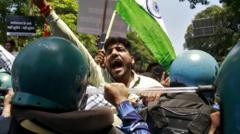Following the tragic loss of 26 lives in Kashmir, diplomatic measures are intensifying between Pakistan and India, amplifying concerns of conflict.
**Escalation in Tensions: Pakistan Halts Indian Visas Following Kashmir Tourist Attack**

**Escalation in Tensions: Pakistan Halts Indian Visas Following Kashmir Tourist Attack**
Pakistan's recent suspension of visas for Indians exacerbates rising tensions in the region after a deadly attack on tourists.
Pakistan has taken decisive action in response to a militant attack in Indian-administered Kashmir that left 26 tourists dead, effectively suspending all visas granted to Indian nationals under a particular exemption scheme. This diplomatic maneuver also includes expelling a portion of Indian diplomats and closing its airspace to Indian flights, signaling heightened tensions between the neighboring countries.
The attack occurred near Pahalgam, a popular tourist destination in the disputed Himalayan region, where gunmen opened fire on a group of visitors. Indian authorities have identified three of the four suspected assailants, stating that two are Pakistani nationals and one a local Kashmiri. However, Pakistan has vehemently denied any involvement in the incident, calling the accusations unfounded.
In a statement, Pakistan's National Security Committee dismissed claims linking the incident to the nation, arguing that there has been no credible investigation or substantial evidence to support India's assertions. Meanwhile, Indian Prime Minister Narendra Modi vowed to bring the perpetrators to justice, emphasizing India's commitment to combat terrorism.
In retaliation, India has initiated a series of diplomatic actions against Pakistan, including a closure of the Attari-Wagah border and the immediate cancellation of visa services for Pakistani nationals. Additionally, Pakistan has countered India's suspension of the long-standing Indus Water Treaty by declaring that any attempt to impede or redirect the water flow would be viewed as an act of war.
Amidst rising military escalations, approximately 1,500 individuals across Kashmir have been detained for questioning in order to gather intelligence on the attack, which is considered one of the deadliest in recent years. After a region-wide shutdown following the violence, schools and businesses are gradually reopening, although a reward of 2 million rupees has been issued for credible information regarding the assailants.
The incident has sparked widespread mourning throughout India, with families of the victims paying their respects. However, rising tensions have also led to troubling reports of harassment against Kashmiri students in various Indian states, prompting concerns over community safety and civil unrest. These unfolding events further complicate an already volatile relationship between India and Pakistan, underlying the urgent need for diplomatic dialogue.
The attack occurred near Pahalgam, a popular tourist destination in the disputed Himalayan region, where gunmen opened fire on a group of visitors. Indian authorities have identified three of the four suspected assailants, stating that two are Pakistani nationals and one a local Kashmiri. However, Pakistan has vehemently denied any involvement in the incident, calling the accusations unfounded.
In a statement, Pakistan's National Security Committee dismissed claims linking the incident to the nation, arguing that there has been no credible investigation or substantial evidence to support India's assertions. Meanwhile, Indian Prime Minister Narendra Modi vowed to bring the perpetrators to justice, emphasizing India's commitment to combat terrorism.
In retaliation, India has initiated a series of diplomatic actions against Pakistan, including a closure of the Attari-Wagah border and the immediate cancellation of visa services for Pakistani nationals. Additionally, Pakistan has countered India's suspension of the long-standing Indus Water Treaty by declaring that any attempt to impede or redirect the water flow would be viewed as an act of war.
Amidst rising military escalations, approximately 1,500 individuals across Kashmir have been detained for questioning in order to gather intelligence on the attack, which is considered one of the deadliest in recent years. After a region-wide shutdown following the violence, schools and businesses are gradually reopening, although a reward of 2 million rupees has been issued for credible information regarding the assailants.
The incident has sparked widespread mourning throughout India, with families of the victims paying their respects. However, rising tensions have also led to troubling reports of harassment against Kashmiri students in various Indian states, prompting concerns over community safety and civil unrest. These unfolding events further complicate an already volatile relationship between India and Pakistan, underlying the urgent need for diplomatic dialogue.






















